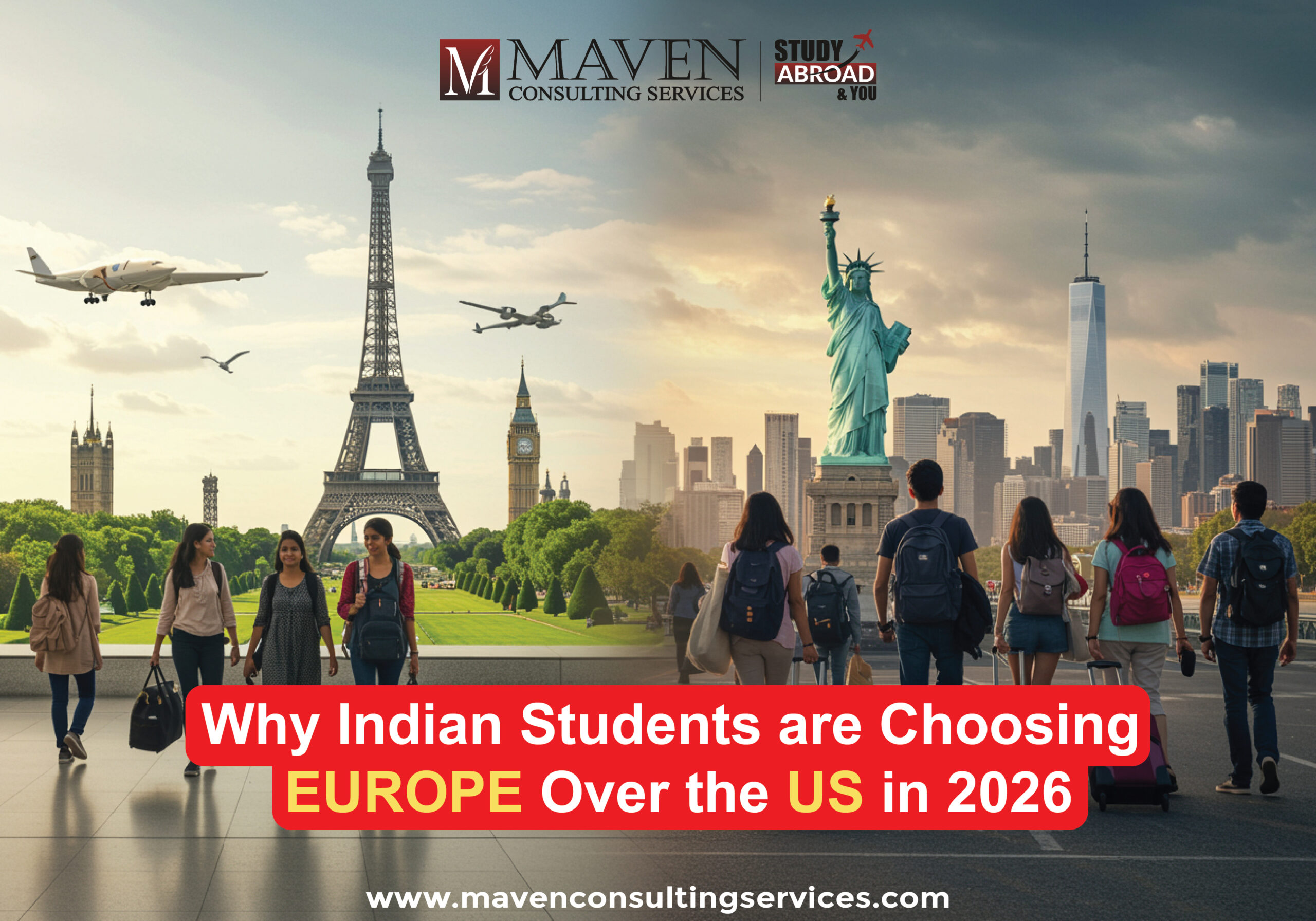WhatsAppCHAT
CALL US& CONNECT

Today, more Indian students are packing their bags for Europe than ever before. The US, UK, and Australia are no longer the top priority in higher education.
Making a mark with its affordable fees, career and growth opportunities, and growth-rich cultural experiences, Europe has surpassed all other study abroad options for Indian students.
This shift will reflect a broader trend in 2026, where Indian students are prioritising cost-effective, globally recognised degrees and smoother post-study transitions to employment.
Studying in Europe is a better choice for your academic future than learning in the USA.
Here are some factors:
European education outperforms all others by providing students with high-quality academic programs at low or no tuition fees. International students at public colleges in countries such as Germany, Norway, Austria, and France pay little to no tuition.
The scholarships available at these universities help ease any further financial burden on students. The following are the major scholarship opportunities for Indian students in Europe:
Some universities in countries like Finland and Sweden also offer tuition waivers and merit-based grants for non-EU/EEA students, reducing costs by up to 100%. In contrast, the US has limited merit-based funding, and Indian students often face:
Limited full scholarships with highly competitive entry criteria.
For many Indian applicants, entrance to Europe is easier. For master’s programs taught in English, several universities waive standardised assessments like
Furthermore, IELTS or TOEFL, even home-based test versions, are accepted in Germany, France, the Netherlands, and Ireland.
In contrast, US colleges often need the GRE/GMAT, TOEFL/IELTS, essays, interviews, and evidence of sound financial standing.
Anxiety and tension surrounding US admissions have increased due to recent visa volatility, including stopped visa interviews and increased inspections.
Europe offers a variety of languages, cultures, and histories it providing a multicultural, multilingual experience that enriches both personal and professional growth.
Universities in Europe focus heavily on interdisciplinary education, project-based learning, and real-world collaboration with local industries.
When contrasted with the changing (and frequently unpredictable) immigration laws in the United States, European countries have implemented student-focused visa policies that make it easier for international graduates to transition into the workforce after completing their studies. European student visas are typically straightforward, stable, and supportive.
In France, graduates with at least a Master’s or equivalent can get a Job Search/Business Creation Permit (RECE) or APS to stay up to 12–24 months and work full-time while finding a job or starting a business. Once employed, you can switch to a Talent Passport or EU Blue Card for long-term work and residency.
https://france-visas.gouv.fr/en/student
In the Netherlands, the Orientation Year (Zoekjaar) visa lets non-EU graduates stay for up to 12 months after completing a degree to work or look for work without a work permit. You must apply within 3 years of graduation from a Dutch institution or a top-200 global university.
https://ind.nl/en/residence-permits/work/residence-permit-for-orientation-year
In Ireland, the Third-Level Graduate Programme allows non-EEA graduates to stay and work full-time after studies for 12 months for Level 8 (Bachelor’s) and up to 24 months for Level 9+ (Master’s/PhD). You must apply within 6 months of graduation while holding a valid Stamp 2 visa. https://www.irishimmigration.ie/my-situation-has-changed-since-i-arrived-in-ireland/third-level-graduate-programme/
In Germany, non-EU/EEA graduates can apply for an 18-month residence permit after completing their studies to search for employment related to their degree. During this period, you can work in any job to support yourself. Once you find a relevant position, you can switch to a residence permit for qualified employment or an EU Blue Card. This pathway offers flexibility and a direct route to long-term residency.
In Portugal, graduates can apply for a Job Seeker Visa to stay for 120 days, extendable by 60 days, to look for employment. During this time, you cannot work until you secure a job offer. Once employed, you can switch to a long-term residence permit such as the D3 Highly Qualified Activity Visa or other work-based permits. This pathway allows graduates to transition from study to skilled employment in Portugal.
https://vistos.mne.gov.pt/en/national-visas/general-information/type-of-visa
These well-organised regulations facilitate students’ transition from education to work without causing them to worry about their visa status all the time.
On the other hand, the H-1B lottery system and OPT (Optional Practical Training) are frequently linked to students in the US, which can be restricted and unpleasant.
Germany’s Chancenkarte (Opportunity Card) and simplified route to permanent residency offer even greater predictability, but such clarity is largely missing from most US post-study pathways.
European economies allow students to pursue job opportunities, enhance their experience and skill set further. Students can:
Indian students in Europe report higher job satisfaction and quicker hiring rates due to favourable visa rules and industry-university partnerships.
Meanwhile, the United States can make it difficult to secure employment through OPT and ultimately an H-1B visa, even after investing in a degree.
Many Indian students are reconsidering their options for studying abroad, with the United States once being the most preferred choice.
Europe offers a well-rounded combination of cultural experiences, affordability, academic achievement, and simpler immigration procedures.
The table below highlights how Europe compares to the US across major factors influencing this shift:
| Aspect | Europe | United States |
| Tuition Fees | Low to no tuition in public universities (e.g., Germany, Norway) | High tuition: $20,000–$50,000+ per year (₹30–70 lakhs) |
| Scholarships | Widely available: Erasmus Mundus, DAAD, Orange Tulip, national schemes | Limited merit-based aid; highly competitive |
| Admission Process | Fewer entrance exams (GRE/GMAT often waived), less documentation | Requires GRE/GMAT, essays, interviews, and financial proof |
| Language Requirements | English-taught programs; IELTS/TOEFL often accepted, even at-home versions | IELTS/TOEFL mandatory; strict score requirements |
| Visa Policies | A Schengen visa allows travel to 26 countries; post-study visas are generous | Complex F-1 to H-1B route; limited OPT time and uncertain outcomes |
| Post-Study Work Options | 18–24 months (Germany, France, Ireland); Chancenkarte in Germany | OPT (1–3 years); H-1B lottery system with limited success rate |
| Living Costs | Generally moderate; varies by country (Germany, Spain, Poland) | High cost of living in major cities (e.g., New York, California) |
| Cultural Exposure | Diverse, multilingual environments; rich historical and cultural experience | Primarily English-speaking; less international cultural diversity. |
| Career Opportunities | Strong presence of MNCs; growing tech and research hubs in EU cities | High-paying jobs are available, but it is harder for international grads to secure them. |
| Permanent Residency Pathway | Clearer, point-based systems in some countries (e.g., Germany’s Chancenkarte) | Lengthy and uncertain green card process |
Many families have lost faith as a result of increased US immigration monitoring, irregular university admissions, and even suspensions of visa interviews. The risk of rejection is too great for students who have paid their tuition and debts, particularly those from Gujarat or Uttar Pradesh.
While interest in European nations increased by about 50% in 2024, the number of Indian students enrolled in US universities fell by about 13%. Over a two-year period, applications to Europe rose by 40% in towns like Lucknow, while those headed to the US, UK, and Canada decreased by over 30%.
Nearly 49,500 Indian students were enrolled in Germany alone by 2025, an increase of more than 15% annually. In all, 48.8% of Indian students studying overseas are in Europe, with the US coming in second at roughly 27.6%.
Countries like Austria, Malta, Portugal, and Spain may become more popular since they provide affordable post-study and scholarship opportunities.
A revolution is taking place in India’s study abroad landscape. Worthy of its position, Europe is now decisively surpassing the US in terms of the growing proportion of Indian students.
One cannot overlook the smart blend that Europe provides: high-quality education, exposure to different cultures, sound financial advice, and viable job paths, all without the uncertainty that has recently hampered US chances.
Germany is a popular choice for students due to its strong job market, globally recognised degrees, and free public colleges. Additionally, countries like France offer rich cultural experiences, Ireland provides an English-speaking environment, and the Netherlands is known for its innovative and high-quality education system.
Indian students can easily move from studies to employment in Germany, Portugal, and Ireland. Germany’s Chancenkarte (Opportunity Card) and Portugal’s post-study work visa policies make it easier to find jobs and apply for permanent residency.
Yes, Europe is becoming increasingly popular among Indian students due to its affordable education, wide scholarship options, post-study work opportunities, and diverse cultural exposure. Many universities also offer English-taught programs and accept standard tests like IELTS.
Indian students are allowed to work part-time jobs while studying in most European countries. France, Ireland, and the Netherlands are among the countries with comparable student-friendly work policies, whereas Germany, for instance, allows up to 20 hours per week during semesters.
Countries with low crime rates, safety, and a friendly atmosphere for overseas students include Finland, Switzerland, Austria, and Ireland. These countries also score highly on indexes of world peace and quality of life.
Absolutely. Many European countries, mainly in Germany, Norway, and Austria, have public colleges that charge little or no tuition. In comparison, the annual cost of studying in the United States, without living expenditures, can range from ₹30 to 70 lakhs. Europe provides significant scholarships to ease the financial burden.

Sunday, October 26, 2025 | The Taj MG Road, Bangalore | 10 AM – 4 PM